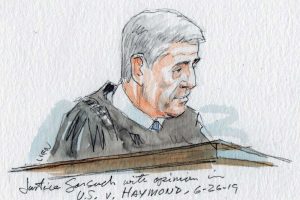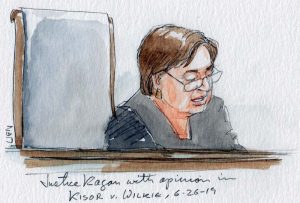A “view” from the courtroom: What the Constitution means to me


The court enters the day with eight argued cases remaining, and a strong presumption that there will be at least one more day of opinions, because Chief Justice John Roberts, on Monday, did not give his traditional announcement that the next court session would be the last one of the term.
Today’s opinions will bring forth a wide range of opinions on various provisions of the Constitution, including Article I, the Fifth and Sixth Amendments and the 18th and 21st Amendments, as well as the principle of stare decisis.
The courtroom atmosphere is unremarkable this morning. The public gallery is full, the bar section has plenty of room and the VIP section is devoid of any spouses of the justices. The alcoves for law clerks are pretty full, though, as the current clerk class has only a couple of more opportunities to see the justices from that unique perspective.
When the court takes the bench, Justice Clarence Thomas is absent. We don’t know where he is, but he will speak here only through his votes this morning.
The chief justice says that Justice Neil Gorsuch has the opinion in United States v. Haymond. Gorsuch cuts right to the chase.

“This case concerns the right to a trial by jury,” he says. “The framers of our Constitution regarded the jury as both a vital protection for the accused, and an essential feature of our system of self-government. To them, a jury made up of ordinary men and women formed a bulwark between the rights of individuals and the power of the state.”
He explains that a jury must find every fact that is essential to an individual’s punishment, and how in two relatively recent cases — 2000’s Apprendi v. New Jersey and 2013’s Alleyne v. United States — the court weighed statutes that increased the range of penalties a defendant could face based on new facts found by a judge by a preponderance of the evidence, rather than only on facts found by a jury beyond a reasonable doubt. The court struck down those sentencing provisions.
Gorsuch describes the case of respondent Andre Haymond, who was sentenced to about three years in prison and a term of supervised release after a jury found him guilty. But after Haymond was accused of violating the terms of his supervised release, a judge found him guilty by a preponderance of the evidence and sentenced him to a new mandatory minimum term of five years in prison.
“By now the problem is probably clear,” Gorsuch says, going on to reject the federal government’s attempts to distinguish Haymond’s case from Apprendi and Alleyne.
Haymond’s new prison term based on facts found by a judge by a mere preponderance of the evidence “offends the ancient right to trial by jury,” Gorsuch says.
He explains that his opinion is joined by Justice Ruth Bader Ginsburg, Sonia Sotomayor and Elena Kagan, with Justice Stephen Breyer filing an opinion concurring in the judgment. Justice Samuel Alito has filed a dissent joined by the chief justice, Thomas and Justice Brett Kavanaugh.
Kagan is up next with the opinion for the court in Kisor v. Wilkie, about whether the court will stand by two key precedents that call on courts to defer to federal agencies’ reasonable interpretations of their own ambiguous regulations.

This case has been eagerly anticipated by those who believe the “administrative state” has grown too powerful. The fact that Kagan is announcing the outcome is likely not reassuring to them. The case involves petitioner James Kisor, a Vietnam veteran who was denied certain disability benefits from the Department of Veterans’ Affairs, with the U.S. Court of Appeals for the Federal Circuit invoking so-called Auer deference to defer to the VA’s interpretation of one its regulations. Auer deference, from the 1997 case Auer v. Robbins, is also called Seminole Rock deference, Kagan points out. That is from a predecessor case, 1945’s Bowles v. Seminole Rock & Sand Co.
Thomas is probably the most justice who most often refers to the principle as Seminole Rock deference. But most people call it Auer deference. That name even led to a quip from Roberts during oral argument, about whether Solicitor General Noel Francisco was referring to “our” or “Auer.”
Kagan explains at some length how the court is retaining its, I mean, Auer deference, but not without clarifying its scope and its limits. And she has another important point she wants to make, which probably no one would interpret as existing in a vacuum.
“We rule today that this form of deference should continue,” Kagan says. “The principle of stare decisis—in English, letting decisions stand—is an important one for stability and evenhandedness in the law. To overrule a case, we need a special justification, and Kisor fails to offer one here.”
The court is remanding Kisor’s case, she says, because the Federal Circuit did not appropriately consider whether the VA regulation to which that court deferred was genuinely ambiguous. as well as for other reasons.
Kagan announces the lineup, but with the remand, it is not crystal clear in the courtroom where things stand. The chief justice has filed an opinion concurring in part, she says. It turns out that Roberts has signed on to parts of her opinion, making those parts a majority. Ginsburg, Breyer and Sotomayor have joined her opinion in full.
Gorsuch has written an opinion concurring in the judgment, joined by Thomas in full and by Kavanaugh and Alito in part. (The court has listed Kavanaugh ahead of Alito, apparently based on the fact that the more junior justice has joined more parts of Gorsuch’s opinion than Alito has.)
Of course, anyone who examines Gorsuch’s opinion will realize it is essentially a strong dissent to the court’s preservation of Auer deference. But he does not read from it in court.
Kavanaugh has a short opinion concurring in the judgment, joined by Alito. His reference to the majority’s discussion of footnote 9 of the infamous Chevron decision (on deference to agency interpretations of ambiguous statutes) includes a reference to the ground rules at Wrigley Field in Chicago. The reference has befuddled at least one foreign-born reporter in the press room, who must turn to his colleagues who have more experience with America’s pastime for some enlightenment.
Roberts announces that Alito has the opinion in Tennessee Wine and Spirits Retailers Association v. Thomas.

This is a case about whether Tennessee’s “durational-residency requirements” for a license to operate a retail liquor store violate the commerce clause in Article I of the Constitution.
Alito refers to the state’s “very demanding” requirements for establishing residency, and those words jump out a bit. Some of the requirements, such as that an applicant reside in the state for 10 consecutive years or that all stockholders of a corporation be residents, were struck down by the U.S. Court of Appeals for the 6th Circuit, and are not being defended by any party here.
At issue before the high court is a provision requiring applicants for an initial license to have resided in the state for the previous two years. That was also struck down by the 6th Circuit, but it is being defended here by the petitioner, which is the state’s trade association for in-state liquor retailers.
Although the executive director of the Tennessee Alcoholic Beverage Commission is the nominal respondent (because the state stopped defending the residency requirements on the advice of its attorney general), it is two out-of-state owners who defended the 6th Circuit’s decision in the Supreme Court.
One is a mom-and-pop store in the Memphis area, long known as Kimbrough Fine Wine & Spirits, which was purchased by a Utah couple, Doug and Mary Ketchum. They were seeking an opportunity to run a business that would allow them to care for their adult daughter, who has severe disabilities.
The other respondent is legally known, somewhat confusingly, as Tennessee Fine Wines and Spirits, but does business as Total Wine Spirits Beers & More. If that name seems more familiar, it is because it is part of a multistate chain founded in Delaware by brothers David and Robert Trone. (David Trone, as it happens, was elected to Congress in 2018 from Maryland’s 6th congressional district, which is the subject of one of the court’s pending cases on political gerrymandering.)
Total Wine sought to enter the Tennessee market with a store in the Knoxville area, and in fact, the store has opened since earlier court rulings in the case.
As part of the, um, reporting on this case for another publication before the March oral argument, I found myself duty-bound to visit a Total Wine store in the Washington area, to get a feel for the atmosphere and to get a sense of the 8,000 wine offerings, the 2,500 beer brands and the various snack offerings. It was just good investigative journalism, people.
Alito explains that Tennessee’s two-year residency requirement, as defended by the state trade group, is being challenged under the so-called dormant commerce clause, which prohibits state laws that unduly restrict interstate commerce.
Alito notes that some members of the court in recent years have offered “vigorous and thoughtful critiques” of this interpretation of the commerce clause, but he says it has “deep roots” that go back to Chief Justice John Marshall and an 1824 case, Gibbons v. Ogden.
He says that if we were to abandon the dormant commerce clause now, leaving the Constitution with no provision curbing state protectionism, such a result “would be unrecognizable to the Constitutional Convention of 1787.”
Alito proceeds to the state retailers’ association’s arguments based on the 21st Amendment, which repealed the 18th Amendment and ended Prohibition, but also allowed states the option of banning alcohol if they so choose.
He gives a short history of the leadup to and aftermath of Prohibition, which his written opinion explores in much greater length.
“During the 19th Century, Americans did a lot of very heavy drinking,” Alito says.
He rejects the state association’s arguments tying the state’s residency requirement to public health and safety concerns, such as that it gives the state a better opportunity to assess an applicant’s fitness to sell alcohol and guards against “undesirable nonresidents” moving into the state to operate liquor stores.
“The provision at issue here expressly discriminates against nonresidents and has at best a highly attenuated relationship to public health or safety,” Alito says.
He also addresses the association’s argument that the two-year residency requirement would promote responsible alcohol consumption because retailers will be familiar with the communities served by their stores.
“The idea, it seems, is that a responsible neighborhood proprietor will counsel or cut off sales to patrons who are known to be abusing alcohol, who manifest the effects of alcohol abuse, or who perhaps appear to be purchasing too much alcohol,” Alito says. “No evidence has been offered that durational-residency requirements actually foster such sales practices, and in any event, the requirement now before us is very poorly designed to do so.”
The bottom line, he says, is that the two-year residency requirement violates the commerce clause and is not saved by the 21st Amendment.
Gorsuch has a dissent, joined by Thomas.
With that, Roberts is ready to declare last call for October Term 2018.
“This court will next sit tomorrow morning at 10 o’clock,” he says. “And at that time we will announce all remaining opinions ready during this term of the court.”
Posted in View from the Court, What's Happening Now
Cases: United States v. Haymond, Kisor v. Wilkie, Tennessee Wine & Spirits Retailers Association v. Thomas